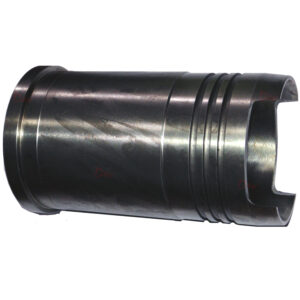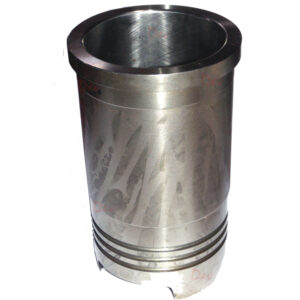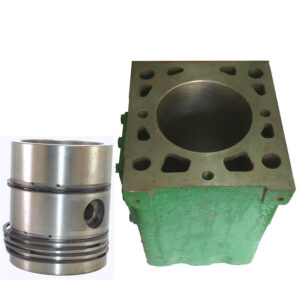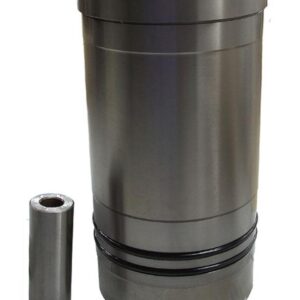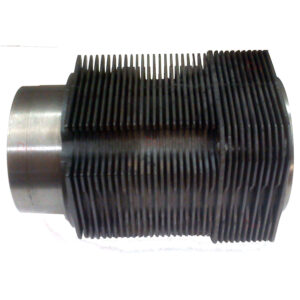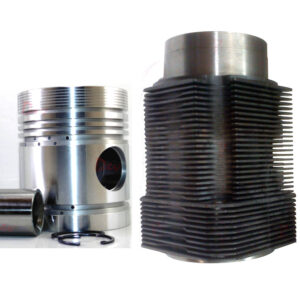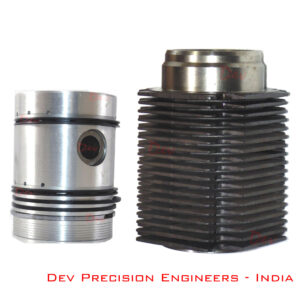Currently Empty: $0.00
Cylinder Barrel Kit
About Cylinder Liners
Cylinder Liners are made of gray cast-iron, ought to have desired casting and machining qualities, viz. strength, toughness, hardness and wear resistance.
These are mainly of two types – Dry liner and Wet liner.
The liners are ‘cast-in fit’, force (press) fit or slip fit.
The interference between its outer diameter and bore-hole walls depends on fit-type from 0.050 to 0.075 mm. These are available in wide range suitable for light, medium and heavy duty application.
In order to meet with industrial quality standards, we manufacture these liners from sand casting and centrifugal casting, which enables us to maintain the uniform hardness all over. Apart from this, we also keep into consideration various factors including distortion-less bore and low thermal expansion to meet with the requirements of our clients. These liners are available in semi finished as well as full finished sizes. Cross honing is done on the full finished products to make the inner bore distortion-less. The inner bores are cross honed to provide maximum smoothness to the surface, that in turn reduces friction, when this inner bore is contacted with Piston Rings.
WET CYLINDER LINERS manufactured by the “CENTRIFUGAL CAST PROCESS” is acknowledged to be the best method. It possesses the bearing metal qualities that cause skin healing after abrasion and a structure that is readily wetted by oil and retains an oil film. Corrosion resistance is further improved by adding Chromium in the metal.
We also accept the customized orders of our clients and manufacture these products in accordance with the samples and drawings with the given material & coating.
Quality:
- Centrifugally cast cylinder liners of actual quality along with precise machining.
- A very good plateau honing and cylindrical grinding that matches the geometrical parameters.
- Manufactured with chromium and nickel elements maintaining the BS4K6 material standard.
- Stringent material along with microstructure analysis of all the batches individually.
- Complete dimensional inspection of the finished components included in the process.
- Inspection of honing angle, structure and surface roughness at a random.
- Tests of profiles, tensile strength and crack detection at regular intervals in a random way.
- Manufacturing experience for the past 25 years and an expertise with single roof manufacturing outlet.
- A very wide range and suitable for up to 1500 models for worldwide cars, trucks, tractors and industrial engines.
- Can produce liners in bulk as well as small quantity in our patch production unit.
Process:
In the centrifugal casting process, the molten metal is poured into a metal mould or die which is revolving at a high speed. The centrifugal force causes the metal to distribute itself evenly around the die. The resulting casting are of much finer grain and free from blow holes or porosity. A further important advantage is that the impurities, being lighter than the iron, are forced centrifugally to the bore surface from which they are removed by machining.
- The centrifugal casted liners are 10% heavier than sand casted liners, because they are close grained, & hence more durable
- They increase the life span of engines by 25% to 30%
- These liners have less wear along with scuff resistance for a longer period
- They can give better life to your vehicles with molly hard rings and molly hard liners.
Features:
High endurance
Robust design
Corrosion resistance
Product Range
- Cast Iron Cylinder Liner
- Wet Cylinder Liner
- Dry Cylinder Liner
- Phosphated Cylinder Liner
- Chromed Cylinder Liner
- Air Cooled Cylinder Liner
- Water Cooled Cylinder Liner
- Finned Cylinder Liner
Finishes
Semi-finished & Fully-finished
Material specification standards
| India | IS-FG 220 |
| Europe | GG20, GG25, GG30 |
| American | ASTM, A48 |
Micro Structure
| Graphite type: | “A” & “B” (“D” & “E” Random) |
| Flake Size: | 4-6 Microns |
| Free Ferrite: | Less Than 5% |
| Matrix | Lamellar Pearline |
| Chemical Composition | Minimum | Maximum |
|---|---|---|
| Carbon | 2.90 | 3.50 |
| Silicon | 1.80 | 2.50 |
| Manganese | 0.6 | 1.00 |
| Phosphorus | 0.20 | 0.50 |
| Phosphorus | 0.00 | 0.12 |
Bukh DV20 DV10 Cylinder Liner
Cylinder Liner for Bukh DV10 DV20 DV24, DV24 ME, DV24 RME, DV29, DV29 ME, DV29 RME, DV32, DV32 ME, DV32 RME.
A high quality replacement Parts for Marine diesel Engine.
Bukh DV24 DV29 DV32 Cylinder liner
Cylinder Liner or Cylinderforing or Zylinderlaufbuchse Part No DEV 41561 Or DEV 000E1561.
A high quality replacement Cylinder Liner for Bukh DV10 DV20 DV24, DV24 ME, DV24 RME, DV29, DV29 ME, DV29 RME, DV32, DV32 ME, DV32 RME.
Bukh DV36 DV48 Cylinder Liner 000E4788
| ITEM | Ref. Part Number | Qty in a Set |
| Cylinder Liner / Cylinderforing / Zylinderlaufbuchse | DEV 000E4788 | 1 Pc |
| O-Ring (2 Per Liners) | DEV 560K1094 | 2 Pc |
We Are also offering separately Piston, ring, pin and Cerclip sets
Piston Complete DEV 008E4864 with Ring set Pt. No DEV 033D0301 / 030D0304
Lister 9/1 & JP Cylinder Liner
We are offering Lister 9/1, JP, Cylinder Liner Part No – DEV 010-02247 and O-Ring Set Pt No DEV – 010-02-116
Lister 9/1 & JP Cylinder Liner Piston Assembly
We are offering Lister 9/1, JP, Cylinder Liner Part No – DEV 010-02247 and O-Ring Set Pt No DEV – 010-02-116
along with PISTON Assembly Pt No 573-10430
Lister CS CYLINDER BLOCK 7 Stud type
Our offer for Lister CS Old type Block includes
Cylinder with Studs DEV- 574-11000
Stud for Cylinder Head (Short) DEV- 027-00862
Stud for Cylinder Head (long) DEV- 027-00805
Stud for Water Pipe Flange DEV- 027-00036
Lister CS Cylinder Block Piston kit 574-11000 and 574-10340
A quality cast cylinder fully machined Along with Standard Size Piston, Ring Pin Set ready to fit for Lister CS engine.
Two types are available, the old seven stud type for Dursley built engines (as pictured) which are machined from one solid casting and new Indian four stud liner type.
Please Buy studs separately
Stud for Cylinder Head (Short) DEV- 027-00862
Stud for Cylinder Head (long) DEV- 027-00805
Stud for Water Pipe Flange DEV- 027-00036
Lister CS Cylinder Liner
These liners are supplied fully machined and ready to fit. These are only suitable for Indian built engines with new five stud type head and a wet liner.
A replacement part of Lister CS and Indian Listeroid 4.5 inch 114.3 Bore for 5/1, 6/1, 8/1, 10/2, 12/2, 16/2
Lister HR Cylinder Barrel Bare
LISTER Petter HR HRW HL Cylinder Block – DEV 353-80971
A Part of LISTER HR HRW HL Cylinder Barrel Piston KIT
Lister HR Cylinder Barrel Kit
LISTER Petter HR HRW HL Cylinder Block Part No DEV 353-80971 Includes Piston Kit Assembly consisting of Quality LM13 Piston.
Piston assembly Pt No DEV – 572-50122 Comprising
1 Piston
2 Piston Ring Set Comprising DEV – 572-50622
3 GUDGEON Pin
4 CIRCLIP 2 Pc 351-50090
Lister LR Cylinder Barrel Piston KIT
Our Cylinder Block / Barrel Piston KIT DEV 201-70110 LR Kit comes complete with
Lister LR PISTON ASSEMBLY DEV – 570-11308







